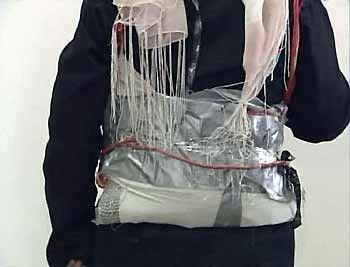|
Iraqi woman confesses on Jordan TV
(AP)
Updated: 2005-11-14 07:30
Jordanian security was tipped off to her presence by al-Qaida in Iraq's claim
of a female bomber, the official added, speaking on condition of anonymity
because he was not authorized to speak to journalists. The group apparently
assumed she was killed in the blasts.
"There were leads that more people had been involved, but it was not clear
that it was a woman and we had no idea on her nationality," the official said.
Al-Rishawi, who is from the volatile Anbar province town of Ramadi, west of
Baghdad, said on state TV that she entered Jordan from Iraq four days before the
attacks with her husband and two other men using fake passports. She said they
rode across the border in a white car with a driver and another passenger.
"My husband arranged our trip from there, I don't know," she said, adding
that they rented a furnished apartment in a middle-class suburb of western
Amman. She said bombers took taxis to the hotels.

A video grab image shows Sajida al-Rishawi who
confessed on Jordanian TV to trying to blow herself up at a hotel in
Amman, showing how she strapped a device to her body, November 13,
2005.[Reuters] | Jordan officials confirmed the
three bombers were Iraqis. Al-Rishawi did not name the other two, but Jordanian
authorities identified them as Rawad Jassem Mohammed Abed and Safaa Mohammed
Ali, both 23.
Muasher said investigations showed no Jordanians were involved, but several
local followers of al-Zarqawi have been arrested.
King Abdullah II told NBC's "Meet the Press" that "all Jordanians are
unified, in that they want the people who are responsible for these crimes to be
brought to justice."
"If we know where they are, even if it's beyond the borders of Jordan, we
will give it the best shot possible to bring these people to justice," he said.
Jordanian counterterrorism officials believe al-Rishawi could provide
significant leads into al-Zarqawi's whereabouts and his terrorist operations in
Iraq.
But the officials, insisting on anonymity because of the sensitivity of their
positions, also fear her capture may spur al-Zarqawi to avenge the arrest with
more attacks in Jordan or against Jordanian interests abroad.
Al-Zarqawi, who traveled from militant training grounds in Afghanistan to
Iraq before the U.S.-led 2003 war, has been sentenced to death in absentia here
for terrorism-related crimes. He has vowed to topple the kingdom's moderate
Hashemite rulers. The U.S. government is offering a $25 million bounty for
information leading to his capture.
Residents of Iraq's Anbar province said al-Rishawi comes from a clan living
mostly in Ramadi, an insurgent stronghold about 70 miles west of Baghdad.
Ironically, the clan, known variously as the Burishas and the Rishawis, is
known for its good ties with the Americans. Its members include Iraq's defense
minister, Saadoun al-Dulaimi, who visited Jordan on Sunday.
Al-Dulaimi offered Jordan his government's support in the bombing probe and
warned that unchecked violence in Iraq will spread terrorism across the region.
He also accused Syria of letting Islamic extremists train on its soil and
enter Iraq to carry out terrorist attacks. The United States and Iraq have
repeatedly called on Syria to lock down its borders and stop al-Qaida extremists
from entering Iraq.
During a tour of the Radisson on Sunday, former President Clinton offered his
support to "defeat this kind of destructive terror that murdered children and
other innocents."
Muasher said the hotels were chosen because they were "easy targets,"
referring to the lax security before the attacks. Security measures have been
increased.
The wedding was targeted because the bombers wanted to "inflict the biggest
number of casualties and victims," Muasher said. The security official said the
Radisson also was targeted is because it is a favorite for Israeli tourists.
The bomb strapped to al-Rishawi's husband was packed with the powerful
explosive RDX and ball bearings and designed to kill as many people as possible,
Muasher said.
The bombing has raised fears that al-Zarqawi's terror campaign has gained
enough momentum to spread throughout the region.
Despite the Iraqi involvement, Muasher insisted relations with its eastern
neighbor are unlikely to suffer.
"It's true that the terrorists are Iraqis, but this doesn't mean that the
Iraqi government is involved or condones such actions," he said. "We all know
that the (Iraqi) government suffers from this group."
|